
At this point, there really is no other way to put it: After seven straight wins, a dominant victory over Kansas on Saturday and a bludgeoning of Vanderbilt on Tuesday night, Kentucky is very much back in the national championship conversation. Admittedly, it probably didn’t take until Tuesday to establish that. But if there was any doubt, a 25-point lobotomizing of Vandy at Memorial Gym proved it.
That’s right, it hasn’t always been easy for the Wildcats, but here we are in mid-January, the Wildcats are ranked No. 7 nationally, arguably the hottest team in the country and the proverbial “club no one wants to play right now.” And it's time to begin discussing them among the best teams in college basketball, and figuring out how they match up.
https://twitter.com/Aaron_Torres/status/1090439049750278152
Which is exactly what I am here to do today. Right now, most experts (myself included) believe there are six teams outside the Wildcats who are capable of winning the title, Duke, Gonzaga, Tennessee, Michigan, Virginia and Michigan State. Maybe one or two others (Nevada?) but that's essentially it.
So how do the Wildcats match up with each? I will spend the next two days breaking each team down, discussing their strengths and weaknesses and how Kentucky might be able to exploit them.
We will start today with three teams – Michigan State, Virginia and Gonzaga. Then tomorrow, we will get to Duke, Tennessee and Michigan.
Here is Part I of a two-part series I like to call “How does Kentucky match up with the contenders”
Michigan State Spartans
What Do You Need to Know?
Michigan State is the Rodney Dangerfield of college basketball: They don’t get any respect. The Spartans don’t have the pizazz of Duke. They aren’t shrouded in West Coast mystery like Gonzaga. They don’t have a half-decade track record of owning their conference (in the most boring way possible) like Virginia does.
But all the Spartans do is win games. They’re just quietly there, twice a week, every week, racking up wins (until Sunday’s loss against Purdue).
And to me that’s what you need to know about Michigan State: They aren’t flashy, but they are efficient. And it’s not like they’re doing it against cupcakes either. The Spartans not only played Kansas, UCLA, Louisville and Florida in the out of conference portion of play, but are also 9-1 in the Big Ten, the toughest conference in college basketball this season. That resume includes six true road wins, a staggering number when you consider just how hard it is to win on the road in college basketball. Kansas for example has one victory in true road games this season. Duke just picked up its fourth. Michigan State already has six.
Add consistency night-in and night-out with the consistent play of two key juniors and yes, you have a team that – at least in my eyes - is capable of cutting down the nets in Minneapolis two months from now.
Strengths
Honestly Michigan State’s greatest strength is that they have no real weakness. Looking at the Spartans, there is just nothing that they do poorly. They don’t go into offensive lulls like Virginia. They don’t struggle from behind the three-point line like Duke. I’m not sure if they do anything on a “10 out of 10” level anywhere on the court. But they aren’t terrible anywhere either.
To back that up, here is where Michigan State currently ranks in a couple major national categories. They are:
No. 6 nationally in offensive field goal percentage
No. 2 nationally in scoring defense.
No. 1 nationally in assists at over 20 per game.
No. 2 nationally in rebounding margin.
I mean,
come on. When you score at an insanely high rate, don’t give up very many points, share the ball and control the boards, how exactly is anyone supposed to beat this team? Again, no wonder they have so much success both on the road and at home. They simply don’t beat themselves.
And it all starts and ends with point guard Cassius Winston. Winston leads the team in scoring at over 18 points per game, is also Top 5 nationally in assists, and is doing it all with the Spartans’ second-best player (wing Joshua Langford) out with injury. That really is the incredible part about watching Michigan State: You know the ball is going to Winston. You know he is going to make a play. And you simply can’t stop him. That’s also why I’ve said I believe that Winston should be the frontrunner for National Player of the Year right now. He isn’t as talented as Zion Williamson. But he absolutely means more to his team.
The other thing that sticks out with the Spartans is that they rotate a bunch of big, strong, powerful bodies in the post like few teams in college basketball. Nick Ward is their best low post player (he’s averaging 15 points and nearly seven rebounds per game), but they also have Xavier Tillman and Kenny Goins, who are both monsters that measure in about 6’8 and around 245 lbs. or so.
Basically, think of Michigan State having three guys with the size and physicality of Reid Travis (even if neither Tillman or Goins is close to as skilled). That’s a team that will wear you out in the post over 40 minutes.
 Weaknesses
Weaknesses
Like a lot of teams on this list, there simply aren’t a ton of weaknesses with Michigan State. The first and most obvious place to start though is in the paint. That’s because while the three big guys mentioned above (Ward, Tillman and Goins) are big, tough and physical, they’re not particularly tall or quick. Frontlines that either have length, superior height or athleticism can give them fits, like Udoka Azibuke did for Kansas in a season-opening match-up between the two. Therefore, one of Kentucky’s weaknesses (Reid Travis’ struggles with big, athletic defenders) will be somewhat mitigated in a matchup with the Spartans. They won’t have to “hide” Travis or try to game-plan away from him.
Also, for as good as Cassius Winston has been, the Spartans don’t have too many guys besides him who can create their own offense. That’s also why Michigan State is especially susceptible if a team just gets crazy hot from the field like Purdue did this weekend.
With the way Michigan State plays defense, that isn’t usually going to be a factor. But we all know that in the NCAA Tournament there is that one game where the other team gets hot and you simply have to outscore them. Can Michigan State do that?
How does Kentucky match up with them: Pretty Well
Of all the title contenders, this is one of the matchups which favors Kentucky the most. While Michigan State does just about everything well, they also don’t do any one thing at an elite level. Because of that, the Spartans can simply wear down inferior teams over the course of the regular season. It wouldn’t be quite so easy against a team as skilled as Kentucky.
If a matchup between the two did happen, the key for Kentucky would probably come in a few different places. One, could P.J. Washington (and to a smaller degree E.J. Montgomery) stretch the floor and get Michigan State’s bigs away from the basket? If the Wildcats are going to try and “out-bully” Michigan State down low with Travis and Washington, it simply isn’t going to work. But if Washington can hit some shots and take their big guys away from the basket, it would open driving lanes and give Travis more room to operate down low.
The bigger question might be whether Ashton Hagans can keep Cassius Winston in check on the perimeter, and also can Hagans take care of the ball on the other end.
Do that, and I like the Wildcats’ chances.
Update: Shortly before this article was released, Michigan State announced that Langford, a junior who was averaging 15 points per game before going down to injury a few weeks ago will miss the remainder of the season. This injury probably takes Michigan State realistically out of the title conversation, even if they are still a really good team.
https://twitter.com/MSU_Basketball/status/1090749410013790209
Virginia Cavaliers
What Do You Need to Know?
So I’m just going to keep it 100 with you: If you’ve watched Virginia over the last six or seven years, they are basically the exact same team. The one notable exception is that they’re just doing it with better players.
By now, we all know the blueprint: Virginia is going to do all the little things needed to win. They are going to play smart, control the pace, not turn the ball over and suffocate you on defense. Basically, if they can do that, they believe they can eventually wear you out and win over the course of a 40-minute game. Basically, the Cavaliers are a boa constrictor trying to suck the life out of its prey. It isn’t about the instant gratification of the big dunk or transition three. It’s about winning the long game.
Again, the pieces have changed, and are probably a bit better than they’ve been in years past. But Virginia’s style certainly has not.
Strengths
To me, the simplest way to explain Virginia’s success is like this: You ever go down to play pick-up basketball at the YMCA with your buddies and run into that team of older dudes who look like they don’t belong on the court? They’re all wearing sweatbands around their balding heads, goggles on their eyes and knee pads just above their shins and yet somehow, they’re wiping the floor with everybody? They’re throwing backdoor passes, putting elbows in your back and somehow get 2-3 wide-open three-pointers per game? And all of a sudden you look up and they’ve been on the court for nine games in a row?
Welcome to Virginia basketball. They’re basically a basketball instructional video come to life. They do all the boring little things that never get featured on SportsCenter, but always win games.
Don’t believe me, here are the stats:
Virginia ranks No. 1 in the country in fewest turnovers, with just 159 entering Tuesday night’s game against NC State. That is by far the fewest for any team who has played that many games this season. They also commit the ninth fewest fouls in all of college basketball and are No. 1 in scoring defense. In the process, they have held some really good teams to some really low point totals. That includes Virginia Tech (59), Florida State (52) and Clemson (43). Woof.
The difference this year is that the Cavaliers are more efficient offensively. They currently average 70 points per game, which is six points more than they scored last season. Also, unlike in years past, they have true difference-makers on the court. Wing De’Andre Hunter (who got hurt last year right before the UMBC loss) will likely be a lottery pick and guard Ty Jerome will hear his name called on draft night if he declares this year as well. Mamadi Diakite is an above average athlete down low, and Braxton Key is a wing who once averaged double figures at Alabama.
In other words, Virginia has some dudes, and that’s what makes this particular Virginia team so scary on offense. They still play at an insanely slow pace (352
nd out of 353 teams in college basketball) but now convert more offensively while playing the same stifling defense.
Basically, there isn’t a team in college basketball that is better at getting you to play
their style. And if the game is played on their terms, there’s a very good chance that eventually they will win.
Weaknesses
To me, the biggest issue with Virginia is the same one it is every season: As I just said above, we all know they can win games playing their style. But can they win games if they get out of their comfort zone? If Kentucky, Duke or Tennessee is down nine points with four minutes to go, all three have the talent and playmakers to overcome it. But at Virginia, can they overcome that deficit?
Now again, to their credit, they are probably more adept at doing that than ever before. Hunter is a versatile chess piece who can score inside and out and as a team, Virginia shoots just under 40 percent from three. Still, it’s one thing to make big shots when you’re up 62-49 with three minutes to go in an ACC game. It’s quite another to do it up one with three minutes to go in a game you’re supposed to win.
And that’s the ultimate end-game for Virginia.
Part of having success in the NCAA Tournament isn’t just about having success playing your style of play, but others as well. You’re going to have to face six different opponents, from six corners of the country, all with different personnel and styles and sometimes you don’t have much time to prepare.
How will handle Virginia handle themselves in these moments? History tells us it might not pretty. And until we see something different, it’s hard to expect anything different.
How does Kentucky match-up: Reasonably well
Because of their muck-it-up style of play, I don’t think anyone truly matches up “well” with Virginia. But I do think that among the Wildcats do have a better chance than most at beating Virginia, even if the Cavaliers are playing their style and at their pace.
For starters, the actual player-by-player matchups favor the Wildcats. Like Michigan State, Virginia is big in the low-post, but not particularly athletic, with the exception of Diakite. Their starting center Jack Salt is tall, but not particularly athletic (insert your own “in other words, he plays like a guy named Jack Salt should”) and Hunter is more of a wing than true low post player. Meaning that Kentucky wouldn’t be at a simple, stylistic disadvantage against the Cavaliers like they would be against some teams. Without a ton of length inside, Reid Travis could have a field day down low (like he did against Kansas) and P.J. Washington would probably be better equipped to bang in the paint against the Cavaliers than some other teams (Michigan State, Gonzaga).
The key for me however would really be two-fold: Could Ashton Hagans run the point and push tempo, to get Virginia out of its comfort zone? And can he do it without turning the ball over? As good as Hagans has been, he can be a bit turnover prone at times (like most freshmen point guards). But you simply can’t give possessions away against Virginia. And when Kentucky is in the half-court, Tyler Herro and Keldon Johnson would have to make quick, decisive decisions with the ball. To their credit that’s what they tend to do anyway. But if they overthink it too much, or try to get cute and put the ball on the floor, Virginia could make them look bad.
At the end of the day, I honestly think that a game against Virginia could go either way for Kentucky. The good news is that the Wildcats likely wouldn’t face them until the Elite Eight or the Final Four. And given John Calipari’s track record in those big games and Virginia’s… umm, lack of a track record in those same games… I’d feel pretty confident in the Cats.

Gonzaga Bulldogs
What do you need to know?
Anyone who follows my work here knows that I’ve been all-in on Gonzaga since basically the moment last season ended. I initially had Gonzaga at No. 1 in my “
Way Too Early Top 25” entering the year, before Ashton Hagans reclassified and Reid Travis committed to Kentucky. I moved the Cats up to No. 1 but kept the Zags at No. 2, and never really stopped believing in them from there.
And to their credit, the Zags haven’t just met my expectations, in a lot of ways they’ve surpassed them. Gonzaga currently sits at 19-2 overall with their only losses coming against a really good Tennessee team and at North Carolina, in a game where they felt the effects of a TON of travel in the pre-conference portion of play. The Zags remain the only team to beat Duke at full-strength and have other solid wins against Washington, Arizona and at Creighton also.
Add in the fact that some of their better players have surpassed any logical expectation entering the season and there’s no other way to put it: The Zags not only entered this season as a national title contender, but they remain there three months later.
Strengths
While so many teams on this list get things done on the defensive end (Michigan, Michigan State, Virginia) there’s no other way to put it: The Zags just put the ball in the hoop. They currently lead college basketball in scoring at over 91 points per game, and before you say “Yeah, but they play in a lousy conference,” just know this: They put up 89 points against Duke, 90 at North Carolina and 102 at Creighton. They are no joke.
Furthermore, I think you could legitimately argue that along with Tennessee, Gonzaga has the best balance of talent and experience in the country. Understand that while everyone likes to say “Old teams win in college basketball” that’s true only to a degree. That’s because it isn’t just about having old players, but good old players. And Gonzaga isn’t just a team with experience but talent too. Not only are four of their five starters either juniors or seniors (including a fifth-year senior at point guard) but just about all of them will eventually play in the NBA. Forwards Rui Hachimura and Brandon Clarke will be first round picks this year, and forward Killian Tillie – who battled injuries early – will likely be a first rounder as well. Wing guy Zach Norvell will probably end up a second rounder on draft night.
Oh, and speaking of the bigs, Gonzaga provides legitimate headaches for teams down low. Brandon Clarke might be the best shot blocker in college hoops not named “Zion Williamson” and is averaging 3.1 per game. Tillie is averaging over a block per game as well.
Honestly, there just isn’t much to nit-pick with the Zags. Again, they’re legit.
Weaknesses
Again, there honestly isn’t much.
In the big picture, the biggest issue for the Zags is that they don’t play great three-point defense and are allowing opponents to make over 36 percent on the season. That ranks 77
th nationally. Also, their guards can at times be turnover prone. To be blunt, that was the biggest issue coming into this season. Yet to his credit Josh Perkins has quieted the doubters and is averaging just under seven assists per game. His back-up Geno Crandall isn’t great, but when looking to the back-up point guard to find a “weakness” with Gonzaga, that shows just how good they are.
And before anyone tells me that Gonzaga’s weakness is their conference, let me ask you this: If the conference puts Gonzaga at such a disadvantage, then why have they made it to the Sweet 16 or beyond in each of the last four seasons? That’s something that Kansas, Duke, Michigan State, Kentucky, Arizona, UCLA and North Carolina can’t say.
History tells us Gonzaga will be locked and loaded for March. And I have no reason to think it’ll be any different this year.
How Kentucky matches up against them: Not well
Along with Duke and Tennessee, I really do think that the Zags would give Kentucky the most problems of anyone in college basketball. And the difference between those other two teams is that the Wildcats won’t have the added benefit of seeing Gonzaga in the regular season like they will Duke and Tennessee.
So what makes Gonzaga so tough? Put simply, it’s that their strength (size and athleticism in the post) goes directly against Kentucky’s biggest weakness, which is that their big guys struggle against length. The Zags also score at an insane clip, so even though Kentucky is defending really well right now, it’s not as though Kentucky will just lock them down like they have other teams.
Honestly, the best game-plan for Kentucky against Gonzaga would be to get Ashton Hagans in Josh Perkins’ grill, tell him to stay, and hope that it wears down Perkins over 40 minutes. Then you better hope the Wildcats are making threes and also playing their usual solid defense.
Kentucky could win the game. But it wouldn’t be easy.
Come back tomorrow, as I break down how Kentucky would fare against Michigan, Tennessee and Duke  At this point, there really is no other way to put it: After seven straight wins, a dominant victory over Kansas on Saturday and a bludgeoning of Vanderbilt on Tuesday night, Kentucky is very much back in the national championship conversation. Admittedly, it probably didn’t take until Tuesday to establish that. But if there was any doubt, a 25-point lobotomizing of Vandy at Memorial Gym proved it.
That’s right, it hasn’t always been easy for the Wildcats, but here we are in mid-January, the Wildcats are ranked No. 7 nationally, arguably the hottest team in the country and the proverbial “club no one wants to play right now.” And it's time to begin discussing them among the best teams in college basketball, and figuring out how they match up.
https://twitter.com/Aaron_Torres/status/1090439049750278152
Which is exactly what I am here to do today. Right now, most experts (myself included) believe there are six teams outside the Wildcats who are capable of winning the title, Duke, Gonzaga, Tennessee, Michigan, Virginia and Michigan State. Maybe one or two others (Nevada?) but that's essentially it.
So how do the Wildcats match up with each? I will spend the next two days breaking each team down, discussing their strengths and weaknesses and how Kentucky might be able to exploit them.
We will start today with three teams – Michigan State, Virginia and Gonzaga. Then tomorrow, we will get to Duke, Tennessee and Michigan.
Here is Part I of a two-part series I like to call “How does Kentucky match up with the contenders”
At this point, there really is no other way to put it: After seven straight wins, a dominant victory over Kansas on Saturday and a bludgeoning of Vanderbilt on Tuesday night, Kentucky is very much back in the national championship conversation. Admittedly, it probably didn’t take until Tuesday to establish that. But if there was any doubt, a 25-point lobotomizing of Vandy at Memorial Gym proved it.
That’s right, it hasn’t always been easy for the Wildcats, but here we are in mid-January, the Wildcats are ranked No. 7 nationally, arguably the hottest team in the country and the proverbial “club no one wants to play right now.” And it's time to begin discussing them among the best teams in college basketball, and figuring out how they match up.
https://twitter.com/Aaron_Torres/status/1090439049750278152
Which is exactly what I am here to do today. Right now, most experts (myself included) believe there are six teams outside the Wildcats who are capable of winning the title, Duke, Gonzaga, Tennessee, Michigan, Virginia and Michigan State. Maybe one or two others (Nevada?) but that's essentially it.
So how do the Wildcats match up with each? I will spend the next two days breaking each team down, discussing their strengths and weaknesses and how Kentucky might be able to exploit them.
We will start today with three teams – Michigan State, Virginia and Gonzaga. Then tomorrow, we will get to Duke, Tennessee and Michigan.
Here is Part I of a two-part series I like to call “How does Kentucky match up with the contenders”
 Weaknesses
Like a lot of teams on this list, there simply aren’t a ton of weaknesses with Michigan State. The first and most obvious place to start though is in the paint. That’s because while the three big guys mentioned above (Ward, Tillman and Goins) are big, tough and physical, they’re not particularly tall or quick. Frontlines that either have length, superior height or athleticism can give them fits, like Udoka Azibuke did for Kansas in a season-opening match-up between the two. Therefore, one of Kentucky’s weaknesses (Reid Travis’ struggles with big, athletic defenders) will be somewhat mitigated in a matchup with the Spartans. They won’t have to “hide” Travis or try to game-plan away from him.
Also, for as good as Cassius Winston has been, the Spartans don’t have too many guys besides him who can create their own offense. That’s also why Michigan State is especially susceptible if a team just gets crazy hot from the field like Purdue did this weekend.
With the way Michigan State plays defense, that isn’t usually going to be a factor. But we all know that in the NCAA Tournament there is that one game where the other team gets hot and you simply have to outscore them. Can Michigan State do that?
How does Kentucky match up with them: Pretty Well
Of all the title contenders, this is one of the matchups which favors Kentucky the most. While Michigan State does just about everything well, they also don’t do any one thing at an elite level. Because of that, the Spartans can simply wear down inferior teams over the course of the regular season. It wouldn’t be quite so easy against a team as skilled as Kentucky.
If a matchup between the two did happen, the key for Kentucky would probably come in a few different places. One, could P.J. Washington (and to a smaller degree E.J. Montgomery) stretch the floor and get Michigan State’s bigs away from the basket? If the Wildcats are going to try and “out-bully” Michigan State down low with Travis and Washington, it simply isn’t going to work. But if Washington can hit some shots and take their big guys away from the basket, it would open driving lanes and give Travis more room to operate down low.
The bigger question might be whether Ashton Hagans can keep Cassius Winston in check on the perimeter, and also can Hagans take care of the ball on the other end.
Do that, and I like the Wildcats’ chances.
Update: Shortly before this article was released, Michigan State announced that Langford, a junior who was averaging 15 points per game before going down to injury a few weeks ago will miss the remainder of the season. This injury probably takes Michigan State realistically out of the title conversation, even if they are still a really good team.
https://twitter.com/MSU_Basketball/status/1090749410013790209
Weaknesses
Like a lot of teams on this list, there simply aren’t a ton of weaknesses with Michigan State. The first and most obvious place to start though is in the paint. That’s because while the three big guys mentioned above (Ward, Tillman and Goins) are big, tough and physical, they’re not particularly tall or quick. Frontlines that either have length, superior height or athleticism can give them fits, like Udoka Azibuke did for Kansas in a season-opening match-up between the two. Therefore, one of Kentucky’s weaknesses (Reid Travis’ struggles with big, athletic defenders) will be somewhat mitigated in a matchup with the Spartans. They won’t have to “hide” Travis or try to game-plan away from him.
Also, for as good as Cassius Winston has been, the Spartans don’t have too many guys besides him who can create their own offense. That’s also why Michigan State is especially susceptible if a team just gets crazy hot from the field like Purdue did this weekend.
With the way Michigan State plays defense, that isn’t usually going to be a factor. But we all know that in the NCAA Tournament there is that one game where the other team gets hot and you simply have to outscore them. Can Michigan State do that?
How does Kentucky match up with them: Pretty Well
Of all the title contenders, this is one of the matchups which favors Kentucky the most. While Michigan State does just about everything well, they also don’t do any one thing at an elite level. Because of that, the Spartans can simply wear down inferior teams over the course of the regular season. It wouldn’t be quite so easy against a team as skilled as Kentucky.
If a matchup between the two did happen, the key for Kentucky would probably come in a few different places. One, could P.J. Washington (and to a smaller degree E.J. Montgomery) stretch the floor and get Michigan State’s bigs away from the basket? If the Wildcats are going to try and “out-bully” Michigan State down low with Travis and Washington, it simply isn’t going to work. But if Washington can hit some shots and take their big guys away from the basket, it would open driving lanes and give Travis more room to operate down low.
The bigger question might be whether Ashton Hagans can keep Cassius Winston in check on the perimeter, and also can Hagans take care of the ball on the other end.
Do that, and I like the Wildcats’ chances.
Update: Shortly before this article was released, Michigan State announced that Langford, a junior who was averaging 15 points per game before going down to injury a few weeks ago will miss the remainder of the season. This injury probably takes Michigan State realistically out of the title conversation, even if they are still a really good team.
https://twitter.com/MSU_Basketball/status/1090749410013790209



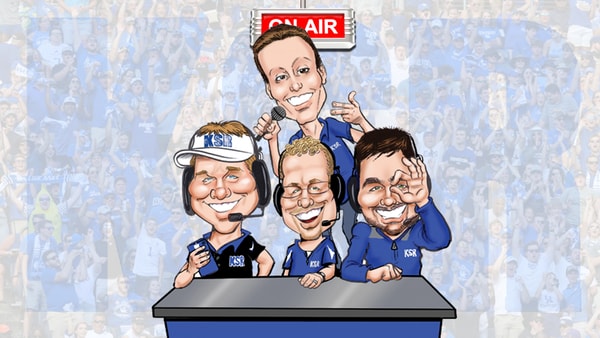
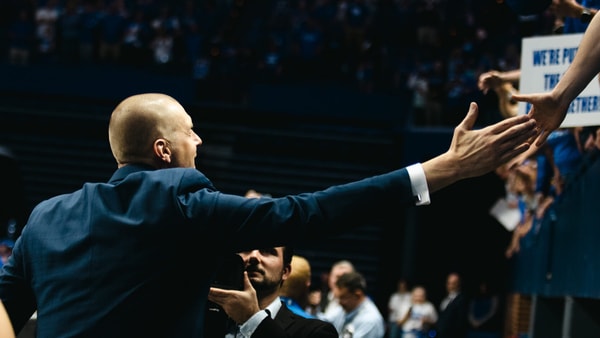
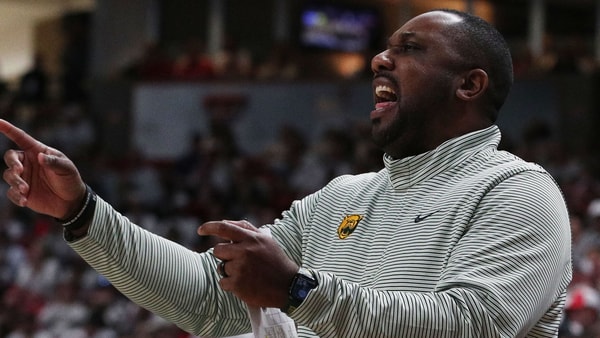
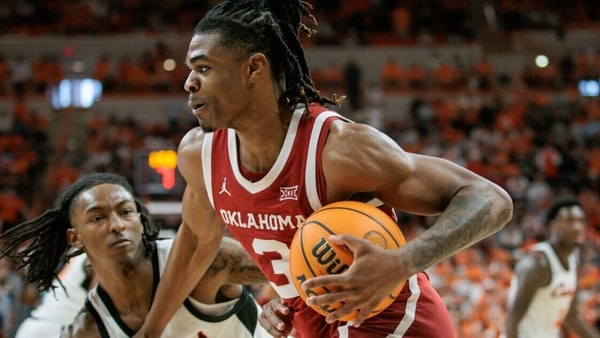
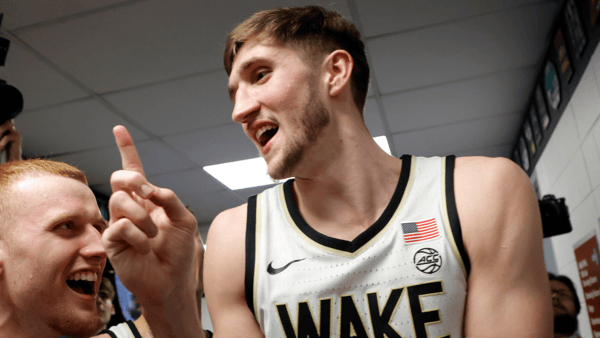
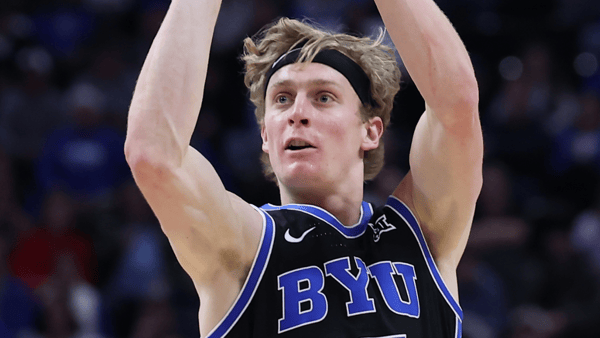
Discuss This Article
Comments have moved.
Join the conversation and talk about this article and all things Kentucky Sports in the new KSR Message Board.
KSBoard